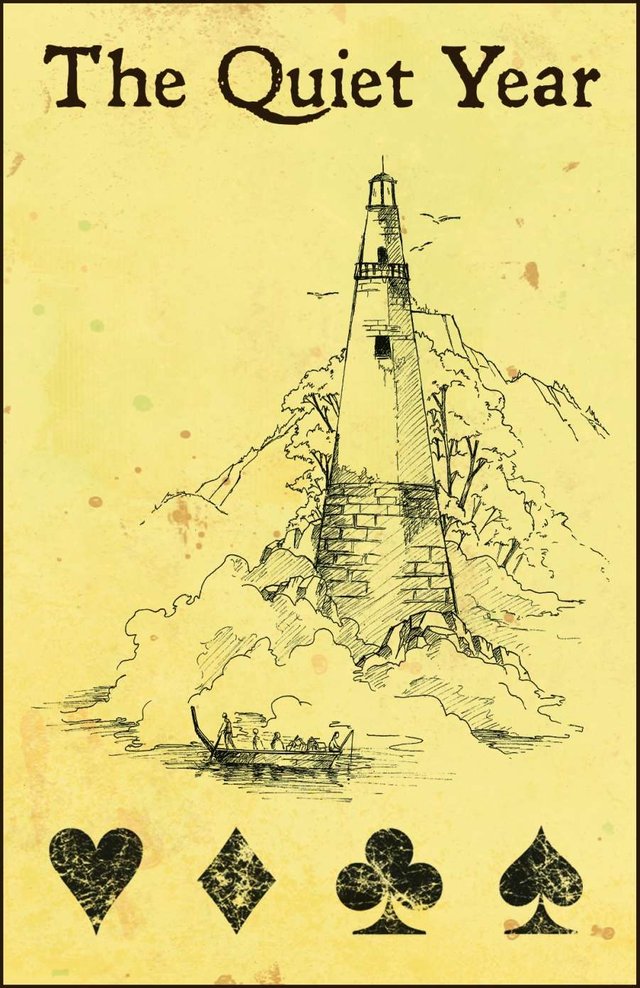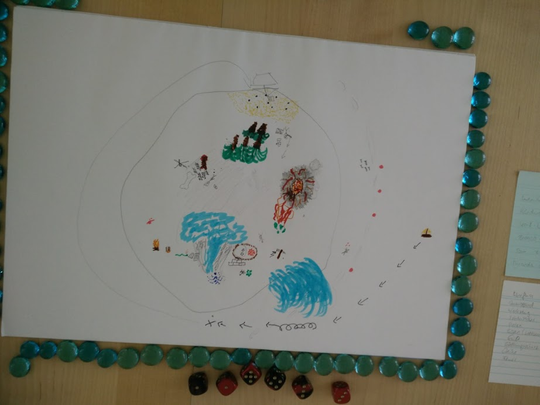The Quiet Year: A Storytelling "Game" [Review]
I got The Quiet Year from a vendor at Crit Hit 3 yesterday, and I've been thrilled with it (mind you, I haven't gotten to play it yet, but I'm really hyped to do so).

The Quiet Year cover, from DriveThruRPG
It's not a huge secret that I'm very into experimental games, but I hesitate to call The Quiet Year (affiliate link) a game, because while it has enough mechanics to classify as a game, I don't think that it really describes it well.
And I definitely don't intend that in a negative way. The Quiet Year is awesome.
But I think that calling it a game could give the wrong impressions (not in the sense of being dishonest, but in not fully conveying what The Quiet Year is). I'd call it more of an storytelling experience or a process, because while there are rules the majority of the time spent playing is in storytelling.
The system used in The Quiet Year is very simple; each person takes a turn, draws a card, and narrates the results. There are a couple interesting elements, like projects and a contempt system, but they're largely representational and not necessarily tied into outcomes. The fundamental conceit is that while people say what happens, they don't get to talk about why they're choosing that as an outcome, and everyone's responsible for telling stories within the same community.
This is the only area where I would say that The Quiet Year can have some "weakness", in that there's not necessarily a whole lot of overarching direction for the story and things seem to have a lack of inertia. This is something that is made up for by having a map that provides a visual representation, but it's definitely the sort of thing that you can't have players phone in.
Of course, this is probably a moot point; the whole point of the experience is to get together to tell a story, and the story's detachment from mechanics leads to more flexibility in doing so at the same time as causing some minor issues.
For instance, you track the resources (or lack thereof) and people of the community, as well as the places around them as part of the narrative, but there's never anything that relies on these to move forward. This is good because of the fact that you'll never have the story end in a way that doesn't go through a logical progression (and the flow through the seasons is fantastic, with a focus on raising tension and exploration that creates an impeccable foundation for telling stories), but it also means that there is a potential gap between what the story will be going forward and what has happened previously.
Projects are a mechanical system that exists to bridge this gap. When you announce a project, you're signifying that you want to see something develop and later whoever "finishes" the project gets to do some narration and draw the result on the map.
Contempt is the other mechanic in the system. Discussing actions ahead of time is not permitted unless people take an action on their turn to do so, and contempt is used as an indicator that someone has done something that disagrees with the player's view of the world (or, rather, that they were not consulted). Players can gain or lose contempt at-will, and can use it to justify an action (remember that players cannot normally explain why they believe something is a reasonable outcome). While the system seems ripe for exploitation, doing so would be heavily against the spirit of the exercise.
I think it's a really interesting premise, and The Quiet Year does a ton of things in terms of its direction that would be really interesting from a design perspective to explore further.
I like the notion of an ovearching community being the focus, rather than individual characters.
Mutant: Year Zero (affiliate link) is something that popped into my head a few times when I was going through The Quiet Year, since the two have relatively similar themes (surviving an apocalypse as a community), but it's amazing how well The Quiet Year can convey many of the things that Mutant: Year Zero uses more complicated systems to do with a simple pairing between a deck of cards that represents events and very light narrative systems, and I even think that The Quiet Year might tell a better story.
I think that the best way to describe the stories told in The Quiet Year would be to draw a comparison to The Giver (affiliate link) and Lois Lowry's other works in that universe. It's very heavily focused on communities without losing sight of the individuals within them, and has a lot of those core archetypal elements that allow us to explore those worlds.
In this sense it makes the post-apocalypse something that is a lot less Mad Max and more human, something that's always bothered me about a lot of post-apocalyptic settings.
The real magic in The Quiet Year comes in the form of its card deck.
You can play The Quiet Year with a regular deck of cards, though if you purchase it in print you can get it with a special deck that has custom cards.
Each card contains two events that players can choose from, and each suit represents a season. It's fantastic, simple, and it really is what drives the storytelling. Again, I hesitate to call The Quiet Year a game because despite the mechanisms at work it is really the player–the storyteller–that does the heavy lifting, but whether it is viewed as a framework for storytelling or a game one has to admit that it is fantastically designed.
These cards are fantastic, tying in to the project mechanics and some of the other elements of the rules, and really ask some good thought-provoking questions and, again, are tuned into the seasons so that they drive the story in a way that encourages first the building of connection to the universe and then the development of tension.
I don't think that there is anything in The Quiet Year that I would consider a misstep. The mechanics aren't necessarily heavy, but they're built to facilitate storytelling and serve as a guide, not a barrier, so the fact that they serve more as cues when developing the plot and points for discussion rather than being heavy-handed is a significant point when you're considering that. It's a fantastically well thought-out design and one that I honestly think has some really good things that designers can learn from.
With that said, there are a couple things I think could be interesting to experiment with:
Everything in the game is supposed to unfold in a single session of play from 2-4 hours, but it would be cool to see some changes to the way the setup works to permit the storytelling to go on for longer periods of time; either multiple subsequent years (which would be undesirable under the current system since the community would have similar events over and over), or by having some more oomph to each individual event to give it some additional time.
It's worth noting that there's not really a reason to have to play in one session; everything is drawn on a map and all projects and the like are able to be recorded. I think it could actually be cool to do The Quiet Year via a play-by-post system electronically, which would open up some new opportunities (e.g. no limits on map size).
The Quiet Year is very much not character focused; you detail individuals or groups within the community, but you don't necessarily "play" as any of them. I think that it would be interesting to see a more character-focused approach to The Quiet Year; maybe it would break down, but it could also be an appealing starting point for something else.
My suspicion is that it'd be more difficult to find one character that a group is likely to focus on, so you'd need more directed cards or mechanics, which could make the experience less positive. The character focus is more of a what-if thing.
I also think it could be cool to add in more cards to the deck, which could accomplish both extending play time and allowing more opportunities to develop a few characters.
One direction this could also take is to go the direction of 13th Age, where you have "Icons" of the setting that are both real entities and archetypal ones simultaneously. This would allow some common points of reference (e.g. the Tower gains influence, but makes an enemy of another important figure) and build a little more depth in the story without making characters belong exclusively to one player. It also allows them to fall and be replaced by other individuals in-universe, while keeping their role in the story valid so that you can tell stories using it.
I got to know 'The Quiet Year' last year and had a really interesting time with it. Our group changed some rules and talked a bit more during the game and not only afterwards. We know each other quite well and play together weekly, other groups might have more differences of opinion and might make more use of the contempt-feature.
I like that The Quiet Year is so different, you can't put a label on it. The drawing, the story telling, no PCs as you are used to... it left a lasting impression. And the cards are really good, seemingly simple but subtle with far reaching consequences if you choose one thing or the other. And as the seasons pass the tension builds. In autumn you know that things you didn't accomplish before won't be done now and hope you succeed without them.
Here's one map of an island we built:

You can play The Quiet Year online quite easily, I know some people who played it via Roll20.
Half of the time I was reading through the booklet I was thinking about how easy it would be to have Roll20 handle the setup for you, and how convenient it would be.
You made a great purchase, it is definitely a gem.
As an experiment, I have used a session of the Quiet Year as a setting premise for a campaign of Apocalypse World. It gave structure and coherence to the usual 'what shall we play' group brainstorm. Overall I think that worked quite well, despite some unforeseen downsides.
I think it would be a great tool to use to set up a campaign, a sort of Session 0 on steroids.
I've played The Quiet Year and had a good time doing so. The people participating definitely affect how, and if, the game flows.
I had thought about doing the first season, then handing out character sheets and telling everyone: "Okay, you've created part of this world, now let's see you play in it."
Shout-out to @muscara, who not only posts some awesome stuff but requested this write-up, meaning that it actually came out instead of getting lost in my pile of "I should do this..." that'll probably come to a crashing halt when my day job resumes.